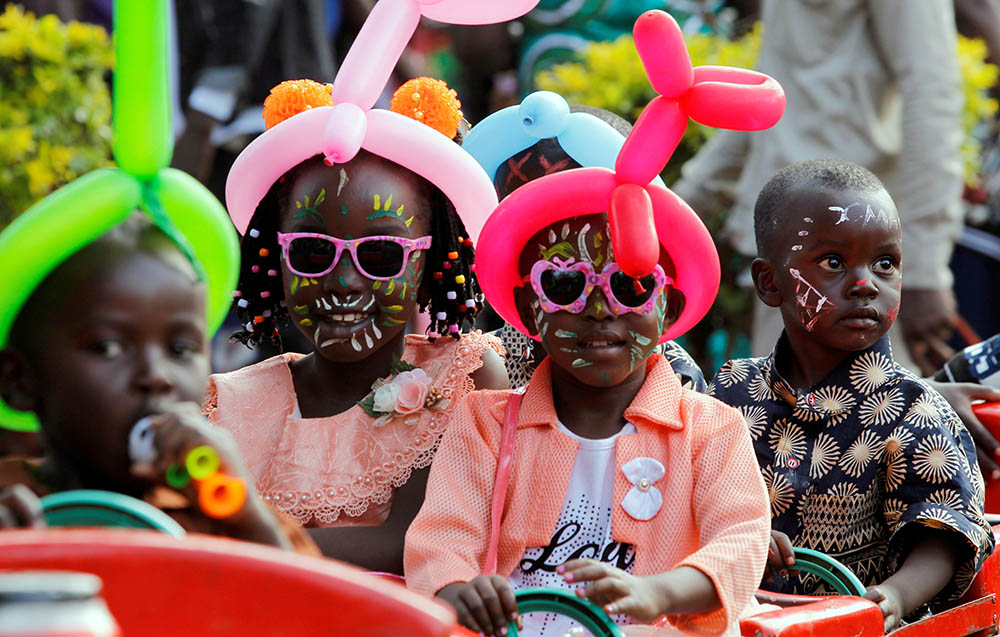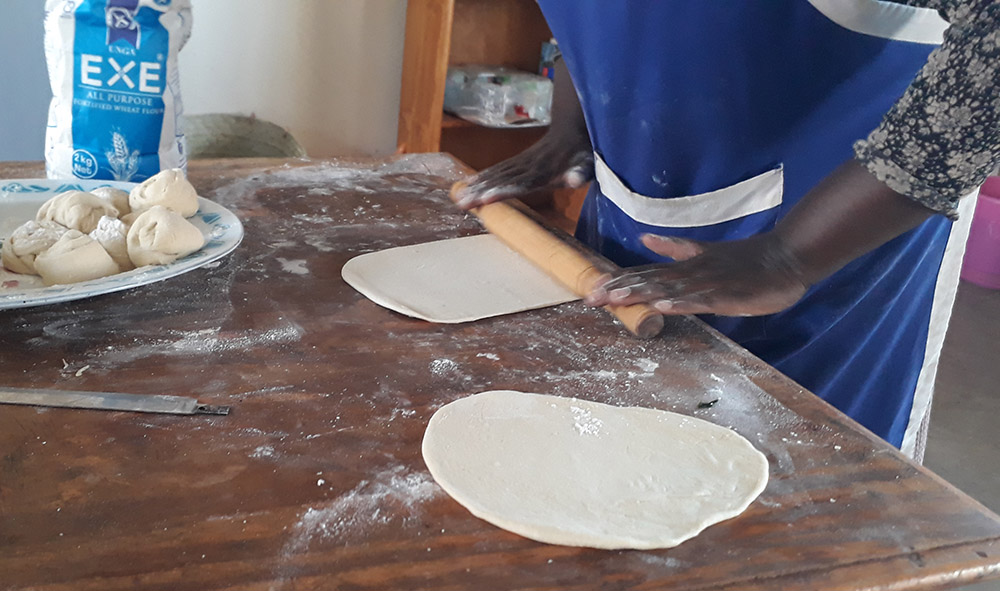
Children in Nairobi, Kenya, ride on a makeshift train Dec. 25, 2019, during Christmas celebrations. (CNS/Reuters/Njeri Mwangi)
The Christmas season is characterized by movement. If I were to rename it, I would call it "a season of homecoming." At the time of the Annunciation, when Mary was given the message by the angel Gabriel and became aware of her cousin Elizabeth's pregnancy, we are told that Mary ran into the hill country to a town in Judah and stayed with her cousin for three months and then went home (Luke 1:39, 56).
Before the birth of Christ, there was a census and people were called to gather in various places (Luke 2:1). So, consciously or unconsciously, the birth of Christ brings us energy to move from our comfort zones and look for others. It is one moment in the year that the longing for communion is conspicuously felt. It gives us the desire to be with our loved ones, some of whom we may not have seen for a while.
I grew up in a rural area, and we had relatives living in the city. At that time, Nairobi was the only city in Kenya. Christmas was one season that we were almost certain that our aunts and cousins would come home; every Christmas we looked forward to it. I remember my aunt who worked and lived it the city with her three children — she had made it a practice to come home for Christmas. This brought a lot of joy to my family and a sense of oneness.
Coming home was not enough; a lot of energy also went into preparing meals, and some families who were able got new outfits for that day.
This solemnity has always fascinated me because — though it is only for a day — the preparations begin very early. Some of the shops will put up decorations as early as August! Christmas carols will also begin to be played on the radios and televisions just as early. I remember how on Christmas Day, besides the special meals, we also used to dance, and the joy was immeasurable.
As you might expect, people won't go to see their relatives empty-handed. This season is one where generosity is explicitly demonstrated. People buy gifts for relatives and friends. The host will be purchasing the type of food they think their loved ones will enjoy eating.

Chapatis are prepared in Nairobi, Kenya. (Wikimedia Commons/GioRan)
When I was growing up, there was a dish we call chapati (a kind of pancake made from wheat but harder than the ordinary pancake). It was the "in thing" and characterized the celebration. At that time, it was an expensive meal. Christmas Day for most families was one of the days that people ate the nicest meals.
As an adult, I have not observed much change; the desire for communion has continued to heighten, especially with increasing urbanization. I continue to attest to the goodness that comes with Christmas. There is a joy that cannot be concealed.
I remember that when I was a student nurse, away from home, we had a tradition for Christmas Eve, when the students went around the wards singing Christmas carols and handing gifts to the patients. Before that, we would have been practicing the Christmas songs for hours. It was awesome and this meant so much to me. I learned to think of others, to share what I have with others and be kind to them.
Christmas experience gives me a feeling of what Peter the apostle must have felt at the moment of transfiguration when he said to Jesus, "Lord, it is good for us to be here. If you wish, I will put up three shelters — one for you, one for Moses and one for Elijah" (Matthew 17:4). We all long for happiness and to connect with others; Christmas gives us a glimpse of what this would look like.
It is a time to transform the face of the earth. Where divisions can cease, hope is restored and God with us — Emmanuel — becomes real. While this is a deep desire of many hearts, sometimes this joy of Christmas seems to fade as soon as it comes. Currently, we are experiencing a lot of family breakups and many people feel justified that the situation is the way it is.
This even escalated as COVID-19 pandemic hit our world. The situation in a way makes it appear like the world has come to an end. Loss of livelihood and interruption of social networks seem to have given way to despair and anger such that spouse turns against spouse, child against parent and sibling against sibling. Hearts are broken and life continues as if business is as usual. This takes away the gains made toward making a heaven down here on earth.
Advertisement
Joy is a treasure that no one wishes to lose, so it is sad that anyone lets the joy of Christmas just go like that. It is like the prodigal son coming home and enjoying the unconditional love of the father, and then going back to the old way of life. The love experienced needs to bear fruit that will last.
As we celebrate this Christmas, let us not treat it as a usual event that comes once a year. Many long to have joy and peace in their life, without finding it. When we experience the joy of Christmas let us look at ways of sustaining it. When people are happy, they are enthusiastic about what they are doing, and life is looked at through a lens of joy and is radiated to others.
One may ask: How do we sustain this joy of Christmas? As people who share with Mary in her joy of Incarnation, let us become people of Visitation. This implies that we move out of our comfort zones and go out to share in the joy of others. We mourn with those who are mourning, remain cognizant of those who need our assistance and be there with them as Mary did with Elizabeth.
Most important of all is that we remain constantly seeking ways to deepen our relationship with God, who will fuel our lives and keep us energized. Here we are being called to be people of prayer. We are to pray not as a duty, but taking up a disposition of contemplation where we can see God in all things and at every moment.
As I advance in age, I realize that one of our setbacks in sustaining the spirit of homecoming is failure to recognize what God is doing in our life. Yet we are told in the song that "great things happen when God mixes with us." I relate this to the idea of counting our blessings. If we do so, then the veil of pessimism that falls over us when we count the losses is removed and we are able to be our brother's and our sister's keeper — since all of us are blessed in diverse ways.
In this way, the commonly used phrase "our richness is in our diversity" will make sense and find a home in us. Come home soon!







